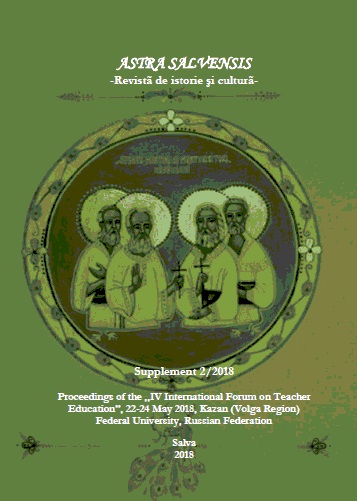DIRECTIONS OF PSYCHOLOGICAL RESEARCH OF ACADEMIC SESSION
DIRECTIONS OF PSYCHOLOGICAL RESEARCH OF ACADEMIC SESSION
Author(s): Mariyam Ravilevna Arpentieva, Polina B. Geraskina, Sergey Viktorovich Lavrinenko, Tatyana Zalavina, Elena N. Kamenskaya, Anna I. TashchevaSubject(s): Social Sciences
Published by: Asociaţiunea Transilvană pentru Literatura Română şi Cultura Poporului Român - ASTRA
Keywords: psychological analysis of training, goal setting; the organization of cognitive activity; motivation of learning activity; style of communication; features of communication; professional reflection;
Summary/Abstract: The psychological analysis of the training session is a complex procedure that makes it possible to investigate the psychological validity and expediency of the teacher‘s actions, as well as to implement a more harmonious and successful design of training sessions in the future. The subject of psychological research / reflection is the behavioral acts (acts and actions) of the teacher: the teacher, the teacher in the class, and the forms of activity of schoolchildren / students caused by them. There are following aspects of the analysis: 1. The goal setting of the lesson and its design, 2. The psychology of organizing the cognitive activity of students, 3. The motivation of students‘ learning activities and building relationships with them, 4. Style and other features of professional communication and didactic communication in general, 5. professional reflection. Despite all the importance of the cognitive, motivational and interactive aspects of actual interaction, professional reflection and goal setting of the specialist play the greatest role in the success of classes and design. The goal setting allows assessing the features of the educator‘s skills in the field of design and construction, reflection – to influence the development of this knowledge and skills. The use of the A.E. Steinmetz scheme of psychological analysis of the training session allows future and working teachers to model a psychologically meaningful way of pedagogical interaction, in which not one is presented, but the system of components of psychological preparation for pedagogical activity. in their professional development and development, the student and teacher move from an analysis of the activities and actions of individual participants to a holistic picture of interaction, uniting their specific, positive and negative, greater or lesser contributions to the design, implementation and reflection of employment, and its various aspects: value-motivational, cognitive, communicative.
Journal: Astra Salvensis - revista de istorie si cultura
- Issue Year: VI/2018
- Issue No: Supp 2
- Page Range: 646-663
- Page Count: 18
- Language: English

